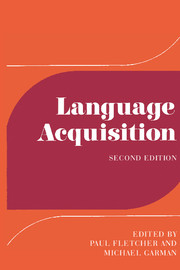Book contents
- Frontmatter
- Contents
- Contributors
- Preface
- Part I Contexts and determinants
- Introduction
- 1 Psychosocial aspects of language acquisition
- 2 Language acquisition and cognition
- 3 Language acquisition and linguistic theory
- 4 Conversations with children
- 5 Learnability
- 6 Variation in child language
- Part II The development of linguistic systems: phonology
- Part III The development of linguistic systems: grammar
- Part IV Later language development
- Notes to chapters
- Bibliography and citation index
- General index
- Titles in the series
2 - Language acquisition and cognition
Published online by Cambridge University Press: 05 June 2012
- Frontmatter
- Contents
- Contributors
- Preface
- Part I Contexts and determinants
- Introduction
- 1 Psychosocial aspects of language acquisition
- 2 Language acquisition and cognition
- 3 Language acquisition and linguistic theory
- 4 Conversations with children
- 5 Learnability
- 6 Variation in child language
- Part II The development of linguistic systems: phonology
- Part III The development of linguistic systems: grammar
- Part IV Later language development
- Notes to chapters
- Bibliography and citation index
- General index
- Titles in the series
Summary
Introduction
To explore the relationships between cognitive development and language development is to enter a very dark forest indeed! It is not so much a question of not being able to see the wood for the trees: one cannot even see the trees. Accordingly, the best advice one might offer to, say, a graduate student would be ‘Danger, keep off’. For those with more leisure and securer positions it is perhaps possible to make an occasional foray without becoming entirely lost, but it should be emphasized that what is both desirable and possible in the study of language development at the present time is more facts, more flower-picking natural history. However, it is sometimes useful to make the attempt at a larger enterprise, if only as a source of ideas about where to look for new flowers.
The large mass of research with a bearing on this relationship has been reviewed by Bowerman (1976) and in a number of publications by Cromer (e.g. 1974, 1976a,b). I think it can fairly be said that one thing missing from these reviews is any sign that a coherent theoretical framework informs current work on the relationship. Indeed, the same might be said of psycholinguistics in general. There is a coherent framework on offer, exposed in Chomsky's (1975, 1980a,b) and Fodor's (1975, 1983) writings and in their various contributions to Piattelli-Palmarini (1980).
- Type
- Chapter
- Information
- Language AcquisitionStudies in First Language Development, pp. 30 - 48Publisher: Cambridge University PressPrint publication year: 1986
- 1
- Cited by



